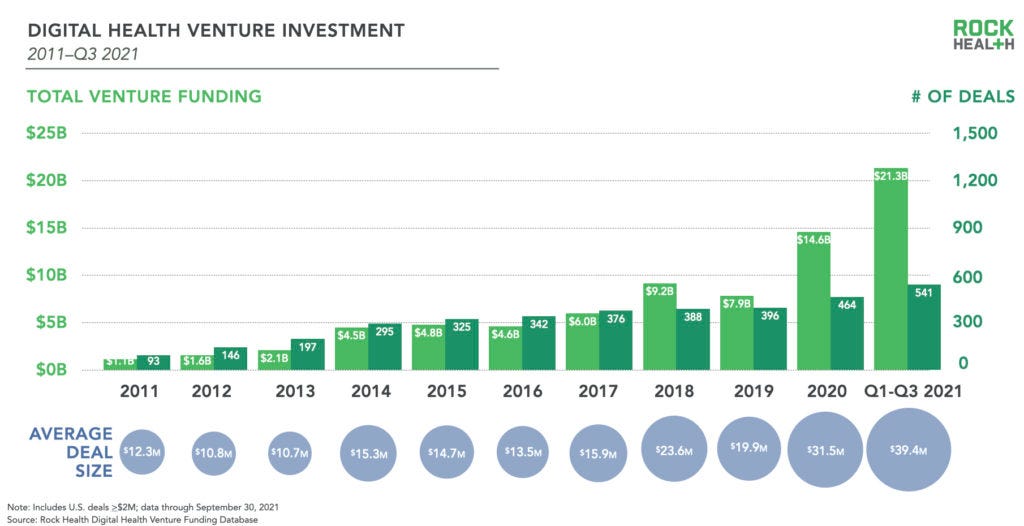The Long Game 77: Digital Health, The Courage to be Disliked, Playing Infinite Games, Honest Brokers
🌐 Cyber War, The Inevitable Rivalry, Work With Cercle, Nestlé, What Will You Leave Behind, and Much More!
Hi there, it’s Mehdi Yacoubi, co-founder at Vital, and this is The Long Game Newsletter. To receive it in your inbox each week, subscribe here:
Here’s a small update from us at Vital, more coming very soon!
📣 We are hiring at Vital, help us build the “Strava for Health.” We are now looking for:
Senior Backend Engineer
Senior Frontend Engineer (Flutter)
Senior Designer
We are offering $1,000 in Bitcoin if you refer to us a candidate we end up hiring.
In this episode, we explore:
Digital health funding
What will you leave behind?
The Courage to be Disliked
Playing infinite games
The inevitable rivalry
Nestlé
Let’s dive in!
🥑 Health
📈 Digital Health Funding
Rock Health recently published a report on digital health funding in Q3 2021. It’s an interesting read to understand where the space is headed.
Digital health funding continues to break records during 2021’s blockbuster year, with the three highest-funded quarters ever. After the impressive sprint of Q2’s $8.2B (a quarter that outpaced 2019’s entire annual funding), Q3 experienced a slight funding slowdown that more closely resembled Q1. Q3 2021 secured $6.7B across 169 deals, just beating out Q1 ($6.4B)3 to be the second-highest quarter of digital health funding ever, surpassed only by its immediate predecessor Q2 ($8.2B).
It’s good to see that many companies are pursuing various approaches to help people be healthier.
🌱 Wellness
🌥 What Will You Leave Behind?
I found this small post from Seth Godin worth sharing:
Twenty years from now, you will have new skills. New customers. A new title and a new kind of leverage.
All of this forward motion requires a less celebrated element–all the things you’re not doing any longer.
To get a new job, you’ll need to leave the old job behind.
When you have a child, you’ve initiated a process that leads to an adult…
Often, we try to pretend that growth comes with no goodbyes, but it does.
Perhaps we can go in with our eyes open, understanding that what we begin will likely end. And when we plan for it, we’ll do it better.
🧠 Better Thinking
🏛 The Courage to Be Disliked
I had The Courage to Be Disliked on top of my list for a while. I decided to listen to the book on Sunday. It was a great decision. I highly recommend it. Here are a few notes on the book:
The book provides a different perspective on mental health that you’re used to seeing in the media where pop psychology or Freudian studies dominate. Here, the book looks at the ideas of psychologist Alfred Adler.
We tend to believe our past determines the future, but, in reality, we are always able to change. We tend to believe that past experience heavily impacts future behavior. We make such suppositions based upon the popular conception of human psychology. We imagine that it’s all rooted in trauma. Adler explains that we don’t have to be defined by trauma. Freedom to transform is always available.
People choose their own specific outlooks on life and are resistant to thinking otherwise. Just think of all the people you know who talk a lot about their unhappiness and how they want their lives to be different. You might think that they want to change, but actually, the reverse is true. According to the author, if they really wanted things to be different, they would have done something about it already.
Competitive societies are destructive, so remember that you shouldn’t let external worries get in your way. Competitive mindsets are exceptionally harmful to mental well-being. A competitive outlook encourages us to think of people as either winners or losers. And, of course, nobody wants to be a loser. Consequently, the tendency is that we start seeing our fellow humans as rivals, as threats and impediments to success. Living in a world packed with rivals is highly stressful.
Live your own life, and don’t try to fulfill the expectations of others. You don’t need recognition or approval from others. To break the cycle of approval, you have to be ready to disappoint everyone, including your family, if you’re going to make the life choices that really are best for you.
Don’t get involved in the lives of others. Every one of us has to learn to take responsibility for our own actions in life.
We’re all part of one big global community, so don’t inflate your ego as if you’re somehow bigger than that.
Self-obsession results in a loss of perspective.
The book explains that “Freedom is being disliked by other people” and that the courage to be happy also includes the courage to be disliked. More broadly, Adlerian psychology is often described as a psychology of courage — i.e., courage to step outside one's comfort zone, be content with what they're born with and live a life not based on external validation. Whether you’re disliked or not, you should pay it no mind and live free — don’t care what people say about you.
⚡️ Startup Stuff
♾ Playing Infinite Games
As you know, it’s about the long game here. Building a company and being involved in a space for the long term is all about the ‘infinite game’ dynamic.
In short, this is the right mindset to adopt if you want to be successful in the long term, but even without considerations of success, it’s the right way to act anyway: treat people well and be an “Honest Broker.” This way, you’ll see compounding returns from people around you.
Ok, so what's an “honest broker”? This piece is an excellent introduction to the concept.
But I need to remember it, if only because I have to tell you about the Honest Broker.
This particular project brought me to China. I was trying to set up an operation in a remote province, far outside my comfort zone, and couldn’t seem to figure out how to maneuver among the various interests and stakeholders. My patron was one of the wealthiest men in Hong Kong, and by using his contacts, I gained access to people who normally operate behind layers of intermediaries and gatekeepers. But even these contacts led me on an endless runaround. My sources gave me conflicting advice and confusing directions. Everything felt wrong and nothing seemed quite on the level.
I knew I needed help, but had run out of options. Then I met the drunk Australian.
The “honest broker” is the person everyone knows is trustworthy and is a person worth working and being involved with:
“So what do I do? Who can I trust?”
“That’s easy, mate. You need to find the Honest Broker.”
This sounded appealing enough, but I had zero idea what my new acquaintance was talking about. He might just as well have told me to go to Oz and consult with the Wizard.
“Who, exactly, is this Honest Broker?”
“There’s at least one in every city. But don’t expect their business cards to say ‘Honest Broker’—that’s just what I call them. But that’s exactly what they are. Sometimes they don’t even have an official position. But they are the key to everything.”
“Honest Brokers” exist in all industries and geographies.
He proceeded to explain how Honest Brokers play a hidden but vital role in communities without a history of legal protections and stable institutions. Their influence and power is built solely on a reputation for straight talk and trustworthy dealings. “They are true brokers, intermediaries between others. They aren’t going to participate in your deal, no matter what it is. They are go-betweens, really. But do not underestimate the power of this kind of brokerage. Whatever you need—a loan, a building permit, political influence, a place to land a private jet, whatever—they will introduce you to the right people and steer you away from the sharks.
“Find your Honest Broker, and your problems will be solved.”
For more: Read the book Finite and Infinite Games by James Carse.
A finite game is played for the purpose of winning, an infinite game for the purpose of continuing the play.
📚 What I Read
🍂 The Great Resignation
People seem to be leaving their jobs en masse:
I first noticed that something weird was happening this past spring.
In April, the number of workers who quit their job in a single month broke an all-time U.S. record. Economists called it the “Great Resignation.” But America’s quittin’ spirit was just getting started. In July, even more people left their job. In August, quitters set yet another record. That Great Resignation? It just keeps getting greater.
“Quits,” as the Bureau of Labor Statistics calls them, are rising in almost every industry. For those in leisure and hospitality, especially, the workplace must feel like one giant revolving door. Nearly 7 percent of employees in the “accommodations and food services” sector left their job in August. That means one in 14 hotel clerks, restaurant servers, and barbacks said sayonara in a single month. Thanks to several pandemic-relief checks, a rent moratorium, and student-loan forgiveness, everybody, particularly if they are young and have a low income, has more freedom to quit jobs they hate and hop to something else.
🤯 It Sounds Crazy
On hearing the story you don’t want to hear:
A big part of almost every story in history is that expectations move slower than facts. People become vested in their views of how the world works. But the world can work one way for a long time and then … boom … abruptly lurch in a new direction. Opinions crawl while events leap. It’s a tricky little thing.
The other is humility in forecasting things that impact you personally. Few things are as persuasive as predictions you desperately want to be true, and few things are as easy to brush aside as predictions that sound a little crazy. The best you can do in that situation is live in a way that doesn’t rely too much on a few seemingly obvious things coming true. If the world plays out in 10 different ways, I want to do OK in all of them.
🇺🇸🇨🇳 The Inevitable Rivalry
America, China, and the tragedy of great-power politics:
None of this should be surprising. China is acting exactly as realism would predict. Who can blame Chinese leaders for seeking to dominate Asia and become the most powerful state on the planet? Certainly not the United States, which pursued a similar agenda, rising to become a hegemon in its own region and eventually the most secure and influential country in the world. And today, the United States is also acting just as realist logic would predict. Long opposed to the emergence of other regional hegemons, it sees China’s ambitions as a direct threat and is determined to check the country’s continued rise. The inescapable outcome is competition and conflict. Such is the tragedy of great-power politics.
What was avoidable, however, was the speed and extent of China’s extraordinary rise. Had U.S. policymakers during the unipolar moment thought in terms of balance-of-power politics, they would have tried to slow Chinese growth and maximize the power gap between Beijing and Washington. But once China grew wealthy, a U.S.-Chinese cold war was inevitable. Engagement may have been the worst strategic blunder any country has made in recent history: there is no comparable example of a great power actively fostering the rise of a peer competitor. And it is now too late to do much about it.
🎙 Podcast Episodes of the Week
This week in podcasts:
This is the episode you need if you’re still skeptical about NFTs and want to understand how they will change the web. A powerful analogy Chris Dixon used: NFTs are the future web pages.
Carl Hart: Heroin, Cocaine, MDMA, Alcohol & the Role of Drugs in Society
This one might be controversial but essential and interesting to listen to. It’s a totally different view on drugs than the one you might hold.
🍭 Brain Food
🇵🇹 Portugal’s Move to Attract Remote Workers
Portugal is recently making a lot of efforts to attract remote workers. Rebase published a report a few days ago showing what Portugal is currently offering.
I know taxes are controversial, and many Portuguese citizens were unhappy to see their country focused on foreigners rather than their people. Still, I find it interesting to see what this new era of remote work will bring regarding taxes/admin stuff and global mobility.
What other countries should get inspired by this initiative? Spain, Italy, and Croatia are the first that come to mind, as they’re well located, sunny, and relatively cheap compared to other countries in Europe.
🎥 What I’m Watching
🍼 Nestlé: The Most Evil Business in the World
I knew Nestlé wasn’t the kindest company, but this really surprised me. The amount of bad things big food corporations are responsible for is astounding. This is something that needs to be exposed to get people to make the right food choices finally.
🌐 Cyber War — US vs. Chine: Has the US Already Lost?
While China made its ambition very clear for a while, the US is slowly waking up from its long nap. Will it be enough?
+ a funny Spanish commentator.
🔧 The Tool of the Week
🎧 Work With Cercle
I shared a lot of tools related to focus music. I like to change what I listen to while I work pretty often. This week, I’ve been working with WorkWithCercle, and I loved it. It’s a simple website helping you watch & listen to music sets from Cercle. Enjoy! My favorite is this one.
🪐 Quote I’m Pondering
Most people die at 25... we just don't bury them until they are 70.
— Benjamin Franklin
If you enjoyed this newsletter, make sure to subscribe if you haven’t 👇
👋 EndNote
Thanks for reading!
If you like The Long Game, please share it on social media or forward this email to someone who might enjoy it. Podcast reviews are also gratefully received. You can also “like” this newsletter by clicking the heart just below this, which helps me get visibility on Substack.
Feel free to email me or find me on Twitter if you have any feedback or questions.
Until next week,
Mehdi Yacoubi
PS: Lots of newsletters get stuck in Gmail’s Promotions tab. If you find it in there, please help train the algorithm by dragging it to Primary. It makes a big difference.






